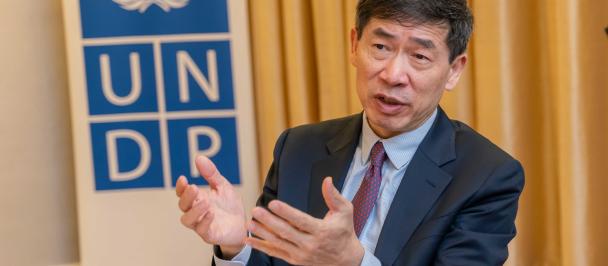Phase 2 of Parliamentary Reforms in Malaysia project kicks off
September 26, 2024

Parliament plays a crucial development role in Malaysia given its status as the highest legislative authority for the country, a platform for examining the government's policies, and a forum to discuss matters of public interest.

The Parliament Project Steering Committee (PSC) meeting took place last Friday morning, chaired by YB Tan Sri Dato’ (Dr.) Johari bin Abdul, Speaker of the House of Representatives (Dewan Rakyat).
As Malaysia progresses in its development journey, Parliament's existing roles should be strengthened accordingly—in terms of secretariat support, as well as procedural and substantive legislative functions—to continue to make it an inclusive and rigorous platform for public policy debate.
The 'Support to Parliament Reforms in Malaysia (Phase II)' Project officially kicked off on 1 August 2024, building on the first phase of the project that was undertaken between 2019 and 2023, funded by the Ministry of Economy, Malaysia, and the Department of Foreign Affairs and Trade (DFAT), Australia. The objective of Phase 1 was: 'By 2025, Parliament's effectiveness as an institution will be strengthened and parliamentary democracy will be enhanced in Malaysia'.
Phase II will continue the work and build on the progress and achievements of the previous Phase I project. Specifically, the Outcomes of the Project are as follows:
(i) The structure and workings of Parliament are strengthened;
(ii) The overall capacity and policy awareness and skills of the Parliament secretariat are enhanced, and Parliament's public outreach is improved
(iii) The capacity of Youth Parliament is enhanced on Sustainable Development Goals (SDGs).
In the context of the current Project, the project aims to enhance the authority of parliament in terms of strengthening the check and balance systems in Malaysia, enhancing the quality of legislation, and as a platform for bringing different parties together for the betterment of Malaysia.
In particular, the structure and workings of Parliament should be strengthened to increase institutional effectiveness and meet people's expectations, and the capacity—including for contribution to policy-making—and public outreach of Parliament should be enhanced.
Additionally, following the lowering of the voting age to 18 years old in Malaysia, the role of youth has become more crucial in shaping today's public policy and political debates. In this regard, it is also important to support Parliament's leadership programmes to boost youth engagement and strengthen young people's leadership skills and awareness of global issues.
“In this regard, Parliament, under the leadership of His Excellency Tan Sri Johari, has pursued several reforms to strengthen the check and balance system, as well as the overall governance and accountability system in Malaysia. In the context of this Project, UNDP is proud to support Parliament in the undertaking of the various initiatives covering strengthening parliament special select committee, capacity building for secretariat staff, and support to the youth parliament,” said Manon Bernier, Resident Representative a.i. of UNDP Malaysia, Singapore, and Brunei Darussalam.
“Globally, we live in a time of increasing uncertainties and complexities in terms of geopolitical competition and international trade. The pathway to economic development is more challenging and narrower, which requires agile policymaking. At the same time, societies are getting older, the impact of climate change is more pronounced, and pressures facing the youth (polarisation, high paying jobs, etc.) are increasing.
“Policies need to be more agile and sustainable. As the country is now drafting the 13th Malaysia Plan and in the next few years – possibly making the jump to high income status, it is also important that governance systems be enhanced accordingly alongside the economic agenda,” she added.
“Policies need to be more agile and sustainable. As the country is now drafting the 13th Malaysia Plan and in the next few years – possibly making the jump to high income status, it is also important that governance systems be enhanced accordingly alongside the economic agenda,” she added.
Additionally, given the presence of coalitions among different parties in the last few years, strengthening parliament as a platform for different parties to discuss policies and legislation for the country has also become very important, in the sense of ensuring policy continuity.
As a development agency with a large footprint on parliament support globally, and close to 70 years of presence in Malaysia, UNDP has extensive experience in working on climate change and the environment, poverty eradication and social protection, economic development, and governance systems. UNDP is also the lead UN agency on SDG integration, which enhances the quality of our support as we are able to work across different SDG goals and integrate multiple development agendas. UNDP looks forward to working with the Special Select Committees, Secretariat and Youth Parliament on these important development agendas under the project.

 Locations
Locations